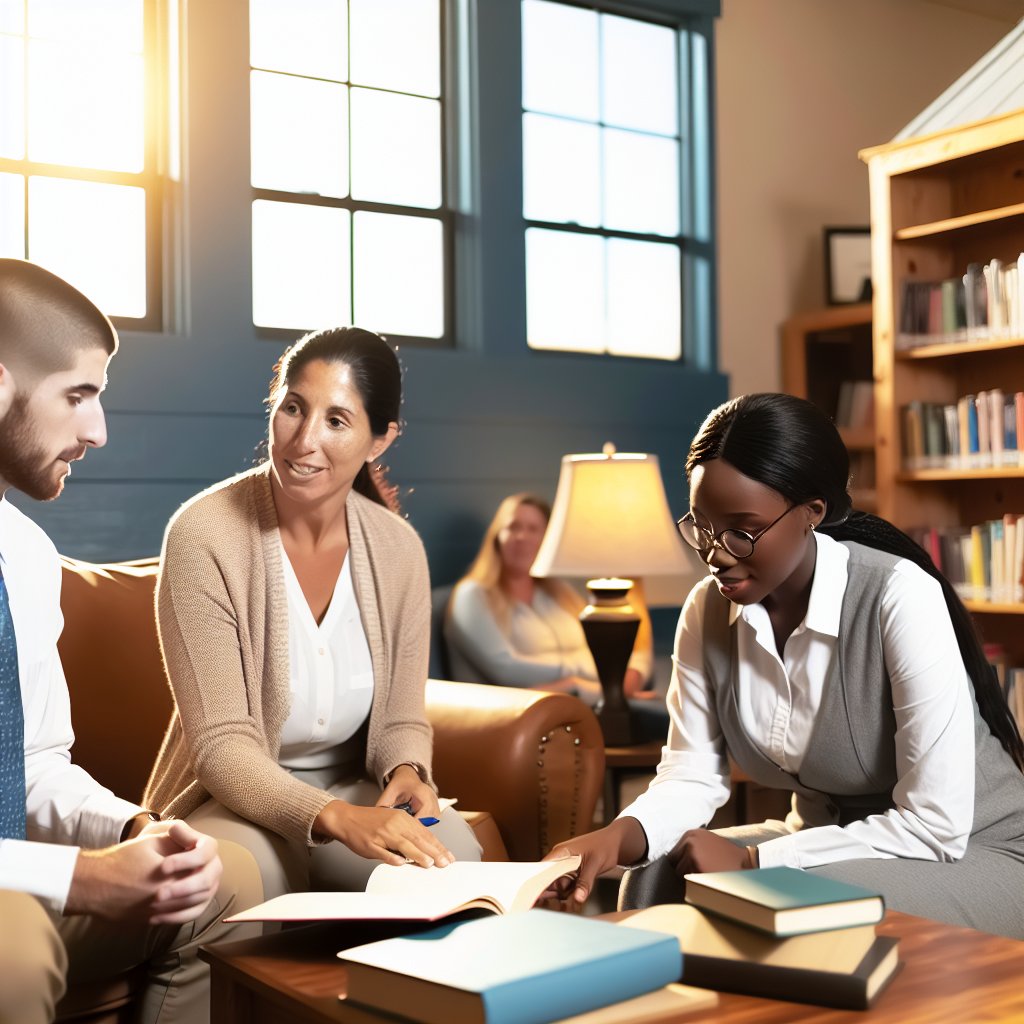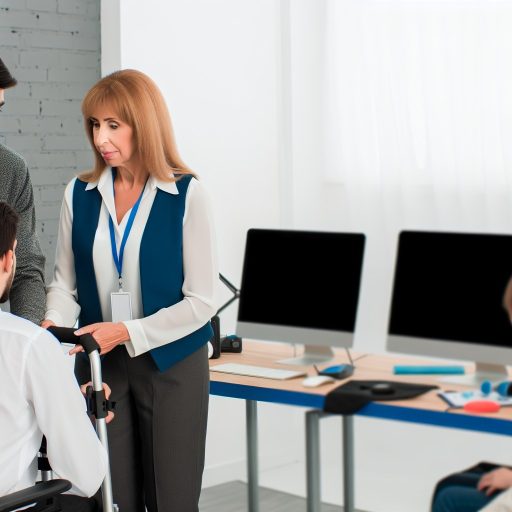Collaboration among residential counseling staff is crucial for the overall success of counseling programs.
By working together, staff members can provide better support and care to residents.
This collaborative effort can benefit the programs by improving communication, increasing effectiveness, and fostering a positive work environment.
Thesis Statement: In this blog post, we will explore the importance of collaboration among residential counseling staff, discuss how it can benefit counseling programs, and provide practical strategies for enhancing collaboration in the workplace.
Clear Communication:
Open and transparent communication is vital among counseling staff to ensure effective collaboration.
Improving communication within a residential counseling team can lead to better outcomes for residents.
Fostering a culture of communication requires intentional effort and commitment from all team members.
Importance of Open and Transparent Communication:
Effective communication is the foundation of successful collaboration among residential counseling staff.
It allows team members to share information, exchange ideas, and work together towards common goals.
When communication is clear, honest, and respectful, it builds trust and strengthens relationships within the team.
Ways to Improve Communication Within a Residential Counseling Team:
- Establish regular team meetings to discuss resident cases, share updates, and address any challenges or concerns.
- Utilize technology such as email, messaging apps, or project management tools to facilitate communication and information sharing.
- Encourage active listening and feedback within the team to ensure that all perspectives are heard and valued.
- Provide training on communication skills, conflict resolution, and cultural competency to enhance effective communication among staff members.
Strategies for Fostering a Culture of Communication:
- Lead by example by practicing open communication, active listening, and transparency in your interactions with team members.
- Create a safe and supportive environment where staff feel comfortable expressing their ideas, thoughts, and opinions without fear of judgment.
- Establish clear communication protocols and guidelines to ensure consistency and clarity in all team interactions.
- Celebrate successes and milestones as a team to reinforce the importance of collaboration and communication in achieving shared goals.
Clear communication is essential for effective collaboration among residential counseling staff.
By prioritizing open and transparent communication, implementing strategies to improve communication, and fostering a culture of communication within the team, residential counselors can enhance their ability to support residents and achieve positive outcomes.
Building strong relationships among counseling staff is crucial for promoting collaboration within a residential counseling team.
Team building activities play a significant role in fostering trust, communication, and unity among team members.
These activities help create a supportive and cohesive work environment, leading to better outcomes for both staff and residents.
Importance of Team Building Activities
- Enhances teamwork: Team building activities encourage staff to work together towards common goals, fostering a sense of unity and collaboration.
- Promotes communication: By engaging in team building activities, counseling staff can improve their communication skills, leading to better understanding and coordination.
- Builds trust: Through shared experiences and challenges, team members can develop trust in one another, creating a strong foundation for collaboration.
- Boosts morale: Team building activities promote a positive work environment, boosting staff morale and job satisfaction.
Examples of Team Building Activities
- Outdoor retreats: Organizing outdoor retreats can promote teamwork and foster a sense of camaraderie among counseling staff.
- Problem-solving activities: Engaging in problem-solving tasks can help staff develop critical thinking skills and effective communication.
- Team challenges: Setting up team challenges, such as scavenger hunts or obstacle courses, can encourage collaboration and teamwork.
- Workshops and seminars: Attending workshops and seminars together can enhance professional development and create a sense of unity among team members.
Benefits of Team Building in Improving Communication and Trust
- Improved communication: Team building activities can break down communication barriers, leading to more effective and open communication among staff.
- Enhanced trust: By engaging in team building activities, counseling staff can build trust and mutual respect, fostering a supportive work environment.
- Increased collaboration: Building strong relationships through team building activities can lead to increased collaboration on projects and tasks.
- Positive work culture: Team building fosters a positive work culture, where staff feel supported, valued, and motivated to work together towards common goals.
Team building activities are essential for promoting collaboration among residential counseling staff.
By investing in these activities, counseling teams can improve communication, trust, and teamwork, ultimately leading to better outcomes for both staff and residents.
See Related Content: Family Support Worker Certification and Licensing
Sharing Resources:
Sharing resources plays a crucial role in enhancing the effectiveness of residential counseling staff.
It allows for a more holistic approach to supporting residents’ needs and promotes a collaborative work environment.
Transform Your Career Today
Unlock a personalized career strategy that drives real results. Get tailored advice and a roadmap designed just for you.
Start NowThe Significance of Sharing Resources and Information Among Counseling Staff:
- Enhances communication and coordination within the team.
- Improves the quality of services provided to residents.
- Increases efficiency in addressing residents’ concerns.
- Promotes a culture of teamwork and shared responsibility.
Methods for Effectively Sharing Resources within a Residential Counseling Team:
- Utilize a centralized platform for sharing documents and information.
- Establish regular team meetings to discuss resource allocation.
- Encourage open communication and knowledge sharing among staff members.
- Develop a system for tracking and monitoring resource usage.
How Sharing Resources Can Lead to Better Outcomes for Residents:
- Residents receive more comprehensive support from a well-informed team.
- Issues are addressed promptly and efficiently through shared resources.
- Residents benefit from a coordinated and cohesive approach to counseling.
- Collaborative efforts result in improved resident satisfaction and well-being.
Sharing resources among residential counseling staff is essential for promoting teamwork, enhancing service quality, and ultimately improving outcomes for residents.
By fostering a culture of collaboration and information sharing, counseling teams can better address the diverse needs of residents and create a supportive environment for their growth and development.
Explore Further: Challenges Faced by Mental Health Technicians
Division of Responsibilities
Importance of clearly defining roles and responsibilities within a residential counseling team.
It is crucial for a residential counseling team to have clear definitions of roles and responsibilities.
This ensures that each member understands their specific duties and how they contribute to the overall team objectives.
Without clear boundaries, there is a risk of duplication of efforts or important tasks being overlooked.
Strategies for dividing responsibilities among team members
- Hold team meetings to discuss and assign roles based on individual strengths and expertise.
- Utilize a shared task management tool to track progress and ensure accountability.
- Encourage open communication and flexibility in roles to adapt to changing circumstances.
- Regularly review and revise responsibilities to ensure alignment with evolving team goals.
How a clear division of responsibilities can prevent conflicts and improve efficiency
When each team member knows their specific responsibilities, it reduces the likelihood of misunderstandings or disputes over tasks.
By clearly defining roles, individuals can work more efficiently and collaboratively towards common goals.
This clarity also allows for better coordination and smoother workflow within the team.
Learn More: Innovative Approaches in Substance Abuse Counseling
Regular Meetings:
- The significance of holding regular meetings to discuss resident cases and program goals.
- Tips for conducting productive meetings among counseling staff.
- How regular meetings can enhance collaboration and problem-solving within the team.
Importance of Regular Meetings:
Regular meetings among residential counseling staff are crucial for effective communication and collaboration.
These gatherings provide an opportunity to discuss resident cases, review program goals, and address any challenges or concerns that may arise.
By coming together on a consistent basis, staff members can stay informed and aligned on their objectives, leading to improved outcomes for residents.
Tips for Conducting Productive Meetings:
To ensure that meetings are productive, it is important to establish clear objectives and agendas in advance.
Encourage all team members to actively participate by sharing their insights and experiences.
Designate a facilitator to keep the discussion on track and ensure that everyone has a chance to contribute.
Follow up on action items and decisions made during the meeting to maintain accountability and progress.
Enhancing Collaboration and Problem-Solving:
Regular meetings foster a sense of teamwork and collaboration among counseling staff.
By coming together to share knowledge and experiences, team members can leverage each other’s strengths and expertise to address complex issues and solve problems more effectively.
Transform Your Career Today
Unlock a personalized career strategy that drives real results. Get tailored advice and a roadmap designed just for you.
Start NowOpen dialogue during meetings encourages creative thinking and innovative solutions, leading to a more cohesive and supportive team environment.
Regular meetings are essential for promoting collaboration and problem-solving among residential counseling staff.
By following these tips and best practices, teams can maximize the value of their meetings and work together more effectively towards achieving their shared goals.
Gain More Insights: Youth Worker vs. Social Worker: Understanding the Differences

Conflict Resolution:
The inevitability of conflicts arising within a counseling team.
Strategies for effectively resolving conflicts among team members.
The importance of addressing and resolving conflicts in a timely manner to maintain a collaborative environment.
Addressing Conflict Within the Counseling Team
Conflict is a natural part of any team dynamic, including a residential counseling staff.
It can arise from differences in opinion, communication breakdowns, or competing priorities.
Regardless of the cause, it is crucial to address conflicts promptly and effectively to maintain a harmonious working relationship among team members.
Strategies for Conflict Resolution
When conflicts arise within the counseling team, it is essential to approach the situation with a level head and an open mind.
Here are some strategies for effectively resolving conflicts:
- Active Listening: Encourage team members to listen to each other’s perspectives without interrupting.
- Empathy: Foster empathy among team members to acknowledge and validate each other’s feelings and emotions related to the conflict.
- Communication: Open and honest communication is key to resolving conflicts.
- Collaborative Problem-Solving: Encourage team members to work together to find solutions that benefit everyone involved.
- Seeking Mediation: If conflicts persist, consider seeking the help of a neutral third party to mediate the situation and facilitate a resolution.
Importance of Timely Conflict Resolution
Addressing and resolving conflicts in a timely manner is crucial to maintaining a collaborative environment within the counseling team.
Failure to address conflicts promptly can lead to resentment, tension, and decreased productivity among team members.
By addressing conflicts proactively and effectively, the counseling staff can foster a positive and supportive work environment.
This environment allows team members to feel heard, valued, and respected.
This, in turn, enhances team cohesion, communication, and overall effectiveness in providing quality care to residents.
Continuous Professional Development:
Professional development is crucial for counseling staff to stay current and effective in their roles.
Here are some important points to consider:
Importance of ongoing training:
- Keeps staff updated on best practices
- Improves skills and knowledge
- Increases job satisfaction and motivation
- Enhances the quality of services provided
Professional development opportunities:
- Encourage staff to attend workshops and conferences
- Provide financial support for courses and certifications
- Offer in-house training sessions and guest speakers
- Facilitate peer learning and mentoring programs
Enhancing collaboration:
- Shared learning experiences create common ground
- Improves communication and teamwork
- Encourages a culture of collaboration and support
- Promotes a sense of community among staff
Improving counseling services:
- Staff with updated skills can provide better support
- Continuously learning staff are more adaptable to change
- Feedback from training can be used to improve services
- Higher quality services lead to better outcomes for residents
Continuous professional development is a cornerstone of effective residential counseling services.
Transform Your Career Today
Unlock a personalized career strategy that drives real results. Get tailored advice and a roadmap designed just for you.
Start NowBy investing in the growth and learning of staff, organizations can enhance collaboration and provide better care to those they serve.
Collaboration Among Counseling Staff
Collaboration among residential counseling staff is essential for providing effective support to residents.
By working together, staff can share insights, resources, and best practices to benefit those they serve.
This blog post highlighted the key points of communication, teamwork, and mutual respect that are crucial for successful collaboration.
It is important to reinforce the significance of creating a cohesive and supportive team that can work together seamlessly.
Readers are encouraged to implement strategies such as regular team meetings, shared goal-setting, and open communication channels within their counseling teams.
Remember, the strength of a counseling team lies in their ability to collaborate and support one another in meeting the needs of their residents.
Take action today by fostering a culture of collaboration within your own team to enhance the quality of care and support provided.
Additional Resources
Supporting Child and Student Social, Emotional, Behavioral, and …
Utah Department of Health and Human Services
[E-Books for Sale]
The Big Book of 500 High-Paying Jobs in America: Unlock Your Earning Potential
$19.99 • 500 High-Paying Jobs • 330 pages
Explore 500 high-paying jobs in America and learn how to boost your career, earn more, and achieve success!
See All 500 High-Paying Jobs of this E-Book
1001 Professions Without a Degree: High-Paying American Jobs You Can Start Now
$19.99 • 1001 Professions Without a Degree • 174 pages
Discover 1001 high-paying jobs without a degree! Unlock career tips, skills, and success strategies for just $19.99!




